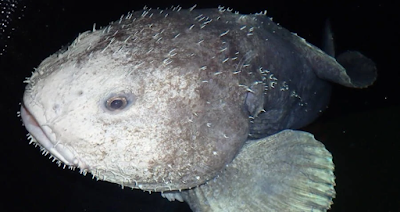The blobfish (psychrolutes marcidus) is a silly little creature that delights us with its slimy droopy appearance. This fish makes us smile. It makes us wonder what kind of a world we live in in which something so gross exists just under the surface of the water. It has been the butt of the joke since it rose to internet fame in the early 2000s.
The truly strange thing about the blobfish is how closely it resembles us. Looking at it's face feels like looking in a distorted mirror. We see an ugly, sad version of ourselves. Its popularity probably has something to do with the fact that it seems to perfectly express a particular mood that we as humans sometimes experience. It is, as the kids say, a mood.
There might be even more to this mood than we originally realized. The blobfish is not as it seems. It lives at a depth of 600 to 1,200 meters below the surface. Remember what it feels like to dive into the deep end of a swimming pool? At this depth, the pressure is roughly 120 times greater than it is at sea level. The blobfish we know, sometimes called Mr. Blobby, was pictured after being pulled to the surface.
 |
| Note the hook in the corner of Mr. Blobby's mouth. |
The abrupt pressure change that a blobfish experiences when being pulled out of the water by a deep sea fishing net causes extreme tissue damage. The fish undergoes a considerable, and frankly rather violent change. Here's what Mr. Blobby looks like at his natural depth.
 |
| The true appearance of the blobfish. |
In his natural environment, the blobfish is, so to speak, a completely different person. They protect their eggs from predators, cruise around at a top speed of five miles per hour, and can live for about 130 years! The blobfish we know is ugly, helpless, and useless. The blobfish in its natural habitat is normal looking, strong, and interesting.
 |
| Mr. Blobby in his natural habitat. |
Of course we will appear/feel ugly and bloated, droopy and sad, when we are forced to exist in a context that is outside of our natural way of being. So be who you are. Judge yourself only by how you live in those moments when you truly feel like yourself. How do you feel when you do something creative? When you go for a run? When you are spending time with the people who are important to you? That is who we truly are. Not how we respond when we are at work or at school, when we are around people we don't connect with, or when we do things for the expectations of others or of our society.
We must never allow others to define us; most importantly, we must never allow ourselves to internally define ourselves by false standards.
Let's make sure we spend some time in our natural habitats.
What makes you feel like you're in your natural habitat? Let me know in the comments.















